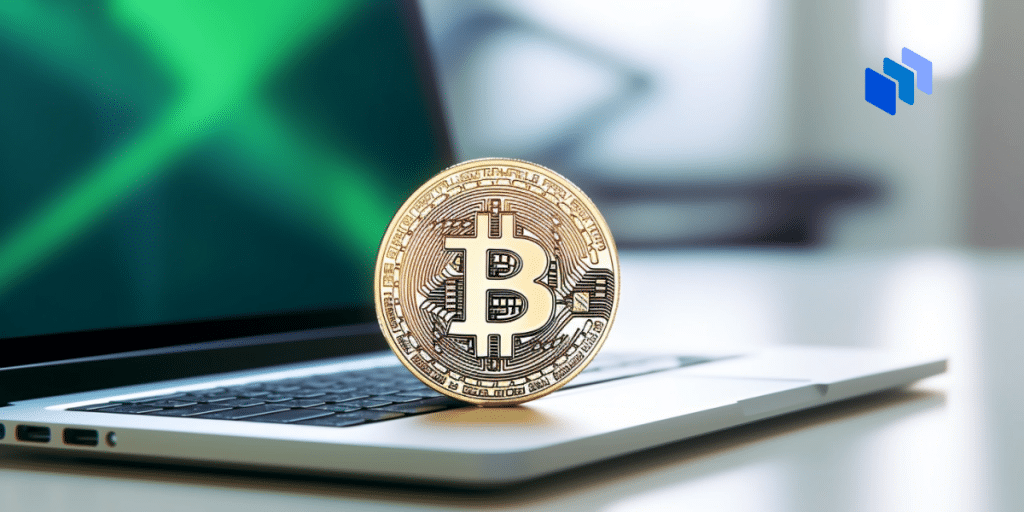At its core, a bitcoin (BTC) transaction is the process of transferring a specific amount of bitcoin from one digital wallet to another.
Transactions happen peer-to-peer, eliminating the need for intermediaries like banks; all bitcoin transactions are securely recorded on a decentralized public ledger known as the blockchain.
How do Bitcoin Transactions Work?
When initiating a bitcoin transaction, users must specify the amount of bitcoin they wish to send and the recipient’s address.
Let’s send a bitcoin! Our example senders and receivers for the day are Hamish and Sinead.
In simple terms, we need to know:
- Input: The address from which Hamish previously received his bitcoins / stores his bitcoins, for instance his wallet address.
- Amount: The number of bitcoins Hamish wants to send, in this case, 0.05 BTC.
- Output: Sinead’s bitcoin address (or her public key) to which Hamish wishes to send the bitcoins.
After specifying these details, Hamish signs the transaction using his private key, ensuring he’s the rightful owner of the bitcoins he’s sending.
This signed transaction is then broadcast to the Bitcoin network.
Miners on the network compete to solve complex mathematical puzzles to verify the transaction.
This process, known as Proof of Work, ensures the network’s security.
The first miner to solve the puzzle gets rewarded, and the verified transaction is added to a new block on the blockchain.
Important to Remember: Public Key vs. Private Key
- Public Key: Analogous to an email address, it’s what you share with others to receive bitcoin. It’s publicly explorable on a blockchain explorer.
- Private Key: Think of this as your email password, granting access to your bitcoins. It must remain confidential.
A Note on Transaction Fees:
- The speed of a transaction largely depends on the fees attached to it.
- Offering a higher fee incentivizes miners to prioritize and validate the transaction faster.
- During network congestion, transactions with higher fees are processed quicker than those with lower fees.
Why Do Some Bitcoin Transaction Confirmations Take So Long?
At its heart, there are two main factors affecting transaction speed:
- Transaction fees: Lower fees can lead to slower confirmations as miners prioritize transactions with higher incentives.
- Network load: The Bitcoin network temporarily stores transactions in the memory pool until miners confirm them. This pool can become congested when many transactions occur, slowing down transaction confirmation times.
How Do Bitcoin Transactions Differ from Traditional Financial (TradFi) Transactions?
When considering Bitcoin transactions as everyday banking transactions, it’s essential to understand how Bitcoin’s network model differs from fiat transactions.
- Decentralization vs. Centralization: Bitcoin transactions are decentralized, meaning any institution or government does not control them. TradFi transactions, on the other hand, require intermediaries like banks, making the process more centralized.
- Transparency vs. Privacy: Bitcoin transactions are recorded on a public ledger, providing transparency. Anyone can view transactions, but they don’t necessarily know who’s behind each address. TradFi transactions are private; banks have this information, but it’s not publicly accessible.
- Speed and Accessibility: Bitcoin can be transacted any time, from anywhere globally, often faster than traditional banking systems, especially for international transfers. In September 2023, there were around 635,000 bitcoin transactions per day.
- Ownership: With bitcoin, once someone has bought bitcoin, users fully own their funds, governed by private keys. In TradFi, banks have control over one’s funds and can freeze accounts if necessary.
Pros and Cons of Bitcoin Transactions vs. TradFi
| Feature | Bitcoin | TradFi |
| Control | Full ownership with private keys | Banks have ultimate control |
| Speed | Fast, especially internationally | Slower, especially for cross-border transfers |
| Accessibility | 24/7 from anywhere | Limited by banking hours/locations |
| Transparency | Public ledger (blockchain) | Private databases |
| Intermediaries | None | Banks, credit card companies, etc. |
| Fees | It can be high during congestion | Often structured and predictable |
| Security | Based on private key management | Based on the bank’s security measures |
While bitcoin offers revolutionary features like decentralization and global accessibility, it also comes with challenges, such as managing private keys securely.
As with all financial decisions, it’s essential to do thorough research and understand the intricacies involved.







